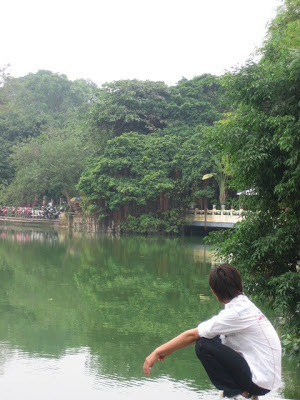In this enchanting new novel Australian author Emily Maguire captures perfectly the shiftlessness and loneliness of expatriate life. Fishing forTigers is her account of love and lust among a group of foreigners living in Hanoi, a group of people marooned in a poor and insular city, not out of any passion for its people or culture, but because:
"...it was the only place they'd found where they could get away with being who they were. The only place with five-star hotel bars, anyway."
 |
| Monastery attached to One Pillar Pagoda, Hanoi (Photo by Walter Mason) |
The novel's protagonist, Mischa, begins a passionate but morally questionable affair with Cal, an eighteen year old Vietnamese adoptee, a young man who only knows life as an Australian and who comes to see his putative homeland through the eyes of the wounded Mischa.
They stumble through a schizophrenic Vietnamese culture, a place torn between the worlds of tradition, Socialism and rampant consumerism. Cal, posing as the cynical and super cool hipster, is astonished when he visits the ancient Confucian university of Van Mieu and discovers its statues have been restored thanks to the donations of a credit card company:
"A communist government sponsored by American Express. Classic."
 |
| Van Mieu (Temple of Literature), Hanoi (Photo by Walter Mason) |
Together the lovers hide, betray and titillate each other, and Maguire's novel is filled with an electric eroticism as well as a trenchant social criticism. The character Mischa is never clearly one thing or another. She is alternately victim and exploiter, sympathiser and traitor. The moral complexities of Maguire's characters make this a thrilling book, and one that offers no easy answers.
Emily Maguire has said that this book emerged out of her own fascination with the city of Hanoi, a city which has enchanted many other Western visitors but has not been written about as much as it should. And Hanoi's claustrophobic intensity is beautifully and perfectly evoked in the book, along with the effect it has on the novel's characters as they drink, sleep and curse their way around an uncertain life in a city that really has no need for them. The confused and messy sex lives of expatriate communities has never been so intimately charted, either, and be prepared for some surprising revelations as the novel proceeds.
 |
| Hoan Kiem Lake, Hanoi (Photo by Walter Mason) |
And Maguire plays with an interesting post-colonial dynamic, opening up a tremendous can of worms by dealing, not only with interracial relationships, but with inter-generational ones. The depth of exploitation, or its absence and pose, is batted around tantalisingly in this book, though Maguire is too smart to ever attempt a definitive answer. The freedom to indulge in pleasure, and the way that living abroad affords this freedom, convinces Mischa that:
“...now my mind was my own and my life was what I decided it should be.”
But of course, events prove that not to be the case.
This is an extraordinary novel, one that will interest anyone who has ever visited Vietnam or who has considered, just for a moment, packing it all in and moving to a distant land. Fishing for Tigers is a very modern dissection of lust, identity and belonging, and I have come away a firm fan of Emily Maguire’s work.
 |
| Van Mieu, Hanoi (Photo by Walter Mason) |
Fishing for Tigers is available through our bookstore affiliates (top right) on this blog. We also welcome your comments and opinions!


No comments:
Post a Comment